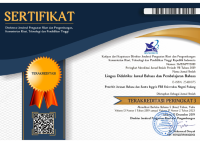The Use of ChatGPT in Higher Education: Student and Lecturer’s Perspectives
 ), Yanti Wirza(2),
), Yanti Wirza(2), (1) Universitas Pendidikan Indonesia
(2) Universitas Pendidikan Indonesia
 Corresponding Author
Corresponding Author
Copyright (c) 2024 Lingua Didaktika: Jurnal Bahasa dan Pembelajaran Bahasa
DOI : https://doi.org/10.24036/ld.v18i2.129331
Full Text:
 Language : en
Language : en
Abstract
The research aims to compare the perspectives of students and lecturers on the use of Chat Generative Pre-trained Transformer (ChatGPT) in higher education. The research follows a comparative study design with a qualitative method. Purposive sampling is used to select participants, including an English lecturer from a university and the researcher, who is a postgraduate student. Data is collected through a semi-structured interview conducted via Zoom. The interview questions cover topics such as the impact of ChatGPT on education, the most involved subjects for ChatGPT, challenges in using ChatGPT, ethical considerations, and the positive and negative impacts of ChatGPT for students and lecturers. Thematic analysis is used to analyze the interview data and compare the perspectives of students and lecturers. The findings highlight the potential benefits of ChatGPT in enhancing the learning experience, providing access to information and resources, and assisting in various educational tasks. However, challenges such as finding specific materials and the need for appropriate keywords are identified. Ethical use is emphasized, and both positive and negative impacts are discussed, including the risk of overreliance and reduced human interaction.
Keywords
References
A. M. Rahman, A. A. Mamun, and A. Islam, "Programming Challenges of Chatbot: Current and Future Prospects," in IEEE Region 10 Humanitarian Technology Conference (R10-HTC), Dec. 2017, pp. 75–78, doi: 10.1109/R10-HTC.2017.8288910.
Aczel, B., & Wagenmakers, E.-J. (2023). Transparency Guidance for the Usage of ChatGPT in Scientific Writing. PsyArXiv. doi: 10.31234/osf.io/b58ex
Agbaglo, E., & Bonsu, E. M. (2022). The Use of Digital Technologies in Higher Education During the Covid-19: Inquiries from the University of Ghana. Social Education Study, 45-57. doi:10.37256/ser.3320221402.
Alkaissi, H., & McFarlane, S. I. (2023). Artificial hallucinations in ChatGPT: Implications in scientific writing. Cureus, 15(2), e35179. doi: 10.7759/cureus.35179.
Andoh, R. P. K., Appiah, R., & Agyei, P. M. (2020). Students’ Perspectives on Postgraduate Online Education at the University of Cape Coast, Ghana. An International Overview of Study in Applied and Designed Learning, 21(2), 118-135.
Anson, C. M., & Straume, I. (2022). Correlation of AI-Based Language Learning to Promote Studnts’ Writing Skill: Amazement and Trepidation. Journal of Academic Writing, 12(1), 1-9.
Bang, Y., et al. (2023). "Evaluating ChatGPT's Performance across Tasks, Languages, and Modalities." In Proceedings of the Conference on Artificial Intelligence (pp. 123-140). Retrieved from arXiv:2302.04023.
Basic, Z., Banovac, A., Kruzic, I., & Jerkovic, I. (2023). "Enhancing Student Essays: Leveraging ChatGPT as a Writing Assistant." In Proceedings of the International Conference on Educational Technologies (pp. 256-275). Retrieved from arXiv:2302.04536.
Biswas, S. (2023). ChatGPT and the Future of Medical Writing. Radiology, 22-33. doi: 10.1148/radiol.223312
Bonsu, E. M. (2023). The Determination of Students' Perceived and Intentional Use of ChatGPT in Ghana's Higher Education Setting.
Borji, A. (2023). A Categorical Archive of ChatGPT Failures. arXiv preprint arXiv:2302.03494.
Creswell, J. W., & Creswell, J. D. (2017). Research Design: Qualitative, Quantitative, and Mixed Methods Approaches (4th ed.). Sage, Newbury Park.
Else, H. (2023). Abstracts written by ChatGPT fool scientists. Nature, 613(7944), 423. doi: 10.1038/d41586-023-00056-7.
Essel, H. B., Vlachopoulos, D., Tachie-Menson, A., Johnson, E. E., & Baah, P. K. (2022). The influence of online instructional technology (Chat GPT) on academic student performance in Ghanaian tertiary institutions. International Journal of Educational Technologies in University, 19(1), 1-19. doi: 10.1186/s41239-022-00362-6.
Fathema, N., Shannon, D., & Ross, M. (2015). Expanding the Technology Acceptance Model (TAM) to Examine Faculty Use of Learning Management Systems (LMSs) in Higher Education. MERLOT Journal of Online Learning and Teaching, 11(2), 210–232. Retrieved from https://jolt.merlot.org/Vol11no2/Fathema_0615.pdf.
Gilson, A., Safranek, C. W., Huang, T., Socrates, V., Chi, L., Taylor, R. A., & Chartash, D. (2023). How Does ChatGPT Perform on the United States Medical Licensing Examination? The Implications of Large Language Models for Medical Education and Knowledge Assessment. JMIR Medical Education, 9(1), e45312. doi: 10.2196/45312.
Guo, B., et al. (2023). How Close is ChatGPT to Human Experts? Comparison Corpus, Evaluation, and Detection. arXiv. doi: 10.48550/arXiv.2301.07597.
Haleem, A., Javaid, M., Qadri, M. A., & Suman, R. (2022). Understanding the role of digital technologies in education: A review. Sustainable Operations and Computers, 3, 275–285. doi: 10.1016/j.susoc.2022.05.004.
Hancock, D. R., & Algozzine, B. (2006). Doing Comparative Study Research. New York: Teachers College Press.
Hosseini, M., Rasmussen, L. M., & Resnik, D. B. (2023). Using AI to write scholarly publications. Accountability in Research, 1-9.
Huang, S., et al. (2023). "Aligning Perception with Language Models: The Role of Multimodal Integration." In Proceedings of the Conference on Artificial Intelligence (pp. 1-10). Retrieved from arXiv:2302.14045.
Khalil, M., & Er, E. (2023). "Will ChatGPT get you caught? Rethinking Plagiarism Detection." arXiv. doi: 10.48550/arXiv.2302.04335.
Liang, L., et al. (2022). "Psychological Distress and Internet Addiction Following the COVID-19 Outbreak: Mediation of Fear of Missing Out and Boredom Proneness." Archives of Psychiatric Nursing, 40, 8-14. doi: 10.1016/j.apnu.2022.03.007.
Lin, Z. (2023). "Embracing AI in Academia: Maximizing the Benefits of ChatGPT and Similar Technologies." PsyArXiv. Retrieved from https://doi.org/10.31234/osf.io/sdx3j.
Lmaiah, M. A., et al. (2022). " Factors Influencing Continuing Purposeful Utilization of Electronic Technology in the Classroom, 11(18), 2827. doi: 10.3390/electronics11182827.
Lund, B. D., & Wang, T. (2023). Chatting About ChatGPT: How May AI and GPT Impact Academia and Libraries? Libr. Hi Tech News, ahead-of-print. doi: 10.1108/LHTN-01-2023-0009.
Mhlanga, D. (2023). Open AI in Education, the Responsible and Ethical Use of ChatGPT Towards Lifelong Learning. Rochester, NY. doi: 10.2139/ssrn.4354422.
Pavlik, J. V. (2023). " Collaborative work with ChatGPT: Considering the Implications of Generative Artificial Intelligence for Journalism and Media Education". Journalism & Mass Media Teacher, 10-22.
Ranoliya, B. R., Raghuwanshi, N., & Singh, S. (2017). Chatbot for University Related FAQs. In 2017 International Conference on Advances in Computing, Communications and Informatics (ICACCI), pp. 1525–1530. doi: 10.1109/ICACCI.2017.8126057.
Schunk, D. (2020). Learning Theories: An Educational Perspective. Pearson.
Siddique, M., Hamayun, M., & Khan, M. A. (2022). "The Impact of Covid-19 on Students' Mental Health in Pakistan: Online Education Pressure, Fear of Failure, and Psychological Distress." Gomal University Journal of Research, 38(2), 180-192.
Thorp, H. H. (2023). ChatGPT is fun, but not an author. Science, 379(6630), 313. doi: 10.1126/science.adg7879.
Tlili, A., Shehata, B., Adarkwah, M. A., Bozkurt, A., Hickey, D. T., Huang, R., & Agyemang, B. (2023). "ChatGPT in Education: Exploring the Potential of Chatbots for Learning Environments." Smart Learning Environments, 10(1), 1-24.
Wiley, D. (2023). "AI, Instructional Design, and Open Educational Resources." In Improving Learning: Enhancing Education with Artificial Intelligence (pp. 78-95). Retrieved from https://opencontent.org/blog/archives/7129.
Yang, X., Li, Y., Zhang, X., Chen, H., & Cheng, W. (2023). "Pushing the Boundaries of ChatGPT: Query and Aspect-based Text Summarization." In Proceedings of the International Conference on Natural Language Processing (pp. 45-62). Retrieved from arXiv:2302.08081.
 Article Metrics
Article Metrics
 Abstract Views : 94 times
Abstract Views : 94 times
 PDF Downloaded : 28 times
PDF Downloaded : 28 times
Refbacks
- There are currently no refbacks.
Copyright (c) 2024 Lingua Didaktika: Jurnal Bahasa dan Pembelajaran Bahasa

This work is licensed under a Creative Commons Attribution-NonCommercial 4.0 International License.









